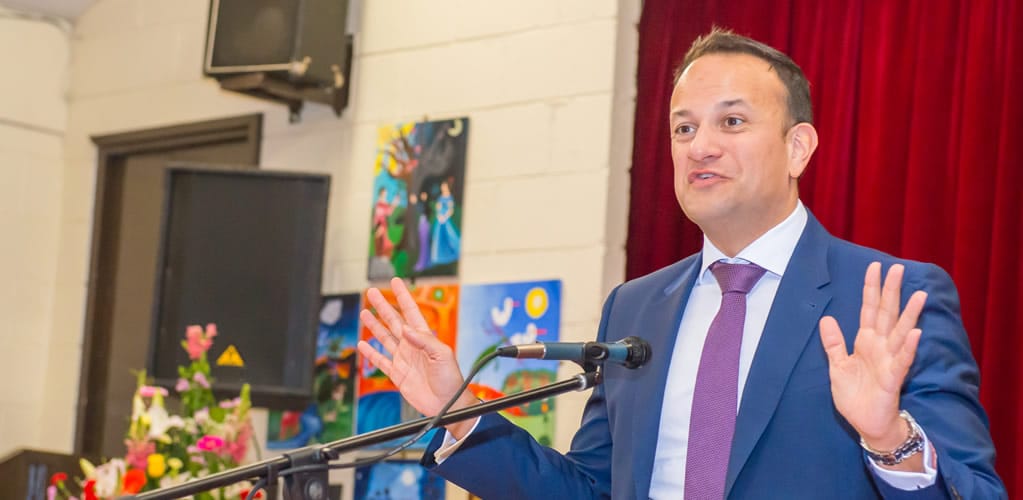Leo Varadkar: The political backdrop to his shock resignation as Ireland’s prime minister
Leo Varadkar unexpectedly resigned as Ireland’s Taoiseach, citing both personal and political reasons, leaving his party, Fine Gael, puzzled. Despite his achievements, recent electoral setbacks and internal party unrest prompted his departure, possibly paving the way for a new European role.

Leo Varadkar unexpectedly resigned as Ireland’s Taoiseach, citing both personal and political reasons, leaving his party, Fine Gael, puzzled. Despite his achievements, recent electoral setbacks and internal party unrest prompted his departure, possibly paving the way for a new European role.
L eo Varadkar stunned Ireland by resigning as taoiseach (prime minister) in an emotional speech that saw him claim to be going for reasons both “personal and political”. However, he hasn’t cited any examples of either, leaving us somewhat in the dark about his departure.
Varadkar’s decision to leave office once a successor is agreed came as a surprise, even to many in his own party, the Christian Democratic centre-right Fine Gael (Party of the Irish). Varadkar had said that he would resign before the age of 50, but, at 45, is leaving well before his self-imposed deadline. Varadkar was seen as young and enthusiastic – and as an openly gay man of Indian-Irish heritage, his rise was symbolic of a changing Ireland.
Varadkar was marked out for political success early on. He entered parliament in 2007 and has been in the cabinet since 2011. He played key roles in referendums legalising gay marriage and liberalising access to abortion and divorce. Becoming taoiseach the year after the 2016 Brexit referendum, he is credited with ensuring that Irish interests were represented by the EU in the difficult negotiations between London and Brussels. But in the process, he became something of a maligned figure among Northern Ireland unionists.
In his most recent period as taoiseach since December 2022, he has been at the helm of a booming economy and budgetary surpluses that are a far cry from the austerity which characterised his early years in government.
However, Varadkar’s electoral fortunes were less convincing. His party lost almost a third of its seats in the 2020 general election and only remained in office by governing with its historical rival, Fianna Fáil and the Green Party. He also lost all five byelections his party contested during his premiership.
Why resign, and why now?
Recently, Varadkar’s coalition government lost surprisingly badly in two referendums aimed at liberalising the national constitution, both of which it had expected to win. A third of his party’s TDs (MPs) have also announced that they won’t contest the next general election.
This paints a picture of a government at odds with the public mood and an internally unsettled party. That said, a renewal of the current Fine Gael-Fianna Fáil coalition is possible as poll leaders Sinn Féin lack obvious coalition partners. Even if Fine Gael does return to government, however, it would likely have a reduced majority in parliament.
It’s possible that Varadkar, having already been taoiseach twice and party leader since 2017, doesn’t have the energy for another election campaign. But his successor must hit the ground running if Fine Gael is to return to winning ways in time for local elections in June. A general election must be held by March 2025, but it may be even sooner following this resignation.
Resigning now gives Varadkar’s replacement a year to get their message across before the general election, but it has left them in the lurch for June. Perhaps the calculation is to let the electorate vent frustrations at ongoing problems around housing costs and more recently, migration, before the next general election.
For Varadkar, personally, there are few obvious jobs available in the short term, so he may take some time away from the spotlight. However, the upcoming European elections might offer opportunities if some of the highest positions in Europe come up for grabs.
The European elections are expected to result in the centre-right European People’s Party (EPP) winning the most seats, a group which includes Varadkar’s Fine Gael. Often, this grants the group the chance to appoint someone to the role of president of the European Commission (the president does not have to be an MEP).
Since 2019 that role has been held by a German, Ursula von der Leyen of the EPP, who was backed for the job by compatriot Angela Merkel, also of the EPP. However, much has changed since. Germany is now led by Olaf Scholz, whose party is in the centre-left Socialists & Democrats group, and he may not want a national rival holding such a high-profile post. Similarly, other EU countries may prefer a non-German leader as countries compete for positions and are wary of too much power resting with France and Germany.
Ireland has never had a commission president and is one of just nine EU countries currently led by the EPP. Conveniently for Ireland, this short list does not include European heavyweights France, Germany, Italy or Spain. If it plays its cards right, Fine Gael could leverage itself as the compromise option for that post.
It would be unwise to make firm predictions here, particularly as Poland and Sweden are led by EPP members – but this would be ideal for Fine Gael. Varadkar’s claim to have no interest in an EU role should be taken with a large pinch of salt. He can’t openly campaign against Von der Leyen, but in reality, few politicians would turn down a chance to take her job.

— Ursula von der Leyen, President of the European Commission.
Ireland’s (newest) youngest PM?
With other potential candidates declaring their intention not to compete to succeed Varadkar, Simon Harris, minister for further and higher education, research, innovation and science, looks set to become taoiseach. A vote could be held at the party conference in April, but as the only candidate at the time of writing, Harris may have things wrapped up well before then. Aged 37, Harris would beat Varadkar’s record as the youngest taoiseach (he was 38) and is seen as a strong media performer.
Harris is young, but has been a TD since 2011 and a minister since 2014, notably serving as health minister during the pandemic. He will take over a party shedding experienced TDs across the country, which will no doubt hurt them at the election.
Opposition parties are already calling for the general election to be brought forward, so Harris must align with both Fianna Fáil and the Greens to push for a longer time frame. Otherwise, a snap election could be on the cards.








[Read our Comments Guidelines]